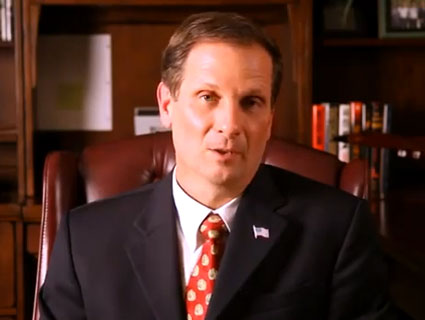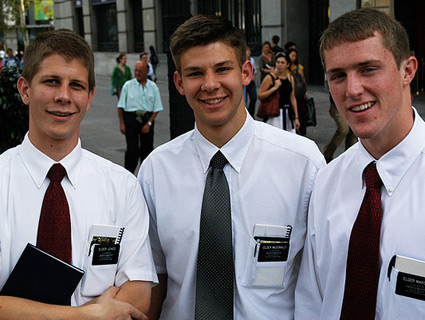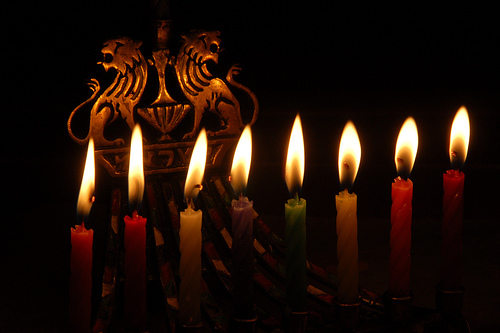
Chris Stewart.<a href="https://www.youtube.com/watch?v=6YYP2gsYNnU">ChrisStewart4UT</a>/YouTube
Glenn Beck likes to say that he never endorses candidates—he just tells his followers how he feels about them. In Chris Stewart, the Republican nominee in Utah’s 2nd Congressional District, Beck has found someone he feels pretty damn good about. “If he wasn’t running, I’d be trying to convince him to work for me, to help me stay the course, strategize, and save the country,” he said last winter, as Stewart’s campaign was just getting off the ground. “I’ve actually tried to talk him out of running, because it’s a lion’s den in Washington.”
But, Beck added, “I believe he’s a Daniel.”
Like the Old Testament figure who emerged unscathed from a pit of lions, Stewart—an Air Force pilot turned consultant turned end times novelist—is also a prophet of sorts, and his message is grim: “If we don’t make some difficult decisions now, if we don’t show the courage to do what we have to do to save our country, we won’t make it for another 10 years,” he said in February, in a campaign video that also served to promote a book he’d just published under Beck’s imprint. But there was hope. “At critical times in our history…we literally had miracles where God intervened to save us,” he said. Send me to Congress, Stewart seemed to imply, and it could happen again.
It’s near certain that Stewart, running in a deep-red district in a deep-red state, will get his chance at fixing Washington next January. But his campaign has raised eyebrows in Utah, where Stewart has left a trail of furious Republicans calling for an investigation into electoral dirty tricks and old hands in both parties predicting the second coming of Michele Bachmann. “From time to time, we get a certified nutcase,” one former Utah Republican politician told me. “And Chris Stewart truly is a certified nutcase.”
A former Air Force pilot who holds the world record for fastest uninterrupted flight around the globe (36 hours, 13 minutes), Stewart first caught Beck’s eye as an author. Stewart has published 15 books, but the 6 that put him on the map were the volumes of the Great and Terrible series, the last installment of which was published in 2008.
“Warning,” Beck said. “It reads a little like, in some ways, Left Behind.”
Beck is hardly the first reader to make the comparison to Tim LaHaye’s famous chronicle of life after the Rapture. (The books are also, by most accounts, quite riveting. One Amazon reviewer calls Stewart “a Mormon Tom Clancy.”) The villain of the Great and Terrible series—other than Satan, that is—is Drexel Danbert, a cigar-smoking, white-haired, ultra-rich European émigré. Danbert controls politicians across the globe like a puppeteer and, as one would expect from an agent of Satan, has the power to control the media too.
In one scene, Danbert and a Saudi crown prince (also an agent of Satan) plot a strategy to undermine the US government by planting a fake story in the media about a massacre by American troops. “Those who hate the United States will believe it, no matter what evidence is eventually revealed. The New York Times will front page the story for five weeks, at least,” the crown prince says. The pair ultimately succeed in creating global chaos by setting off an electromagnetic pulse (EMP) that destroys America’s electrical infrastructure and forces a small group of heroes to band together to survive and defeat the forces of evil.
Stewart scoffs at the notion that his books, like the Left Behind series to which they’re often compared, are religious tracts. “They’re not theological books; they’re not history books or predictions,” he says. “They’re not nonfiction. They’re just novels. And we would never read anything more into them than that. They’re just a way of telling a story.” He adds, “The only thing that we think is meaningful in the book in terms of, ‘Listen people, we should be aware of this,’ again is the threat of electromagnetic pulse.”
“All you’ve got to do is go read the Senate report on that,” Stewart continues. “That’s not a particularly new idea, lots of people realize the EMP would be a terrible event for our nation. And that’s all I was talking about. The whole point of the Great and Terrible series is what happens to the United States if an EMP attack were to take place.”
But in a 2009 interview with Meridian Magazine, an LDS-oriented publication, about the series, Stewart, who’s also written a self-help book called Redefining Joy in the Last Days, suggested that the religious underpinnings of his books were more than just a plot device. “The timing for events of the last days can catch us unaware as well,” he said. “It is why we listen to the prophets and why we read the scriptures to be prepared. In the Book of Mormon, Samuel the Lamanite came and gave them a five-year warning before Christ’s birth. Maybe we’ll get that.”
(A quick glance on Amazon reveals that his readers got the message. “The author provides an eerie review of how Satan and his minions may influence us in our decision-making and life directions,” writes one reviewer. Another adds: “I’m taking stock of our storage of food, water, medicines, and the means to protect ourselves and our neighborhood” in the event of an EMP strike.)
Utah Republicans are wary of Stewart for reasons other than his end-times-themed writings. Some are upset about how he won the nomination. Utah uses primaries only as a last resort, preferring to hold county- and then district-nominating conventions and proceeding from there only if the race is still deadlocked. Three days before the 2nd District’s convention in April, delegates received an anonymous mailer filled with personal attacks on Stewart.
The mailer didn’t have much of an impact until a little-known Republican candidate, a small town mayor named Milt Hanks who had made almost no campaign appearances, announced at the convention that he had been invited to join an anti-Stewart cabal called the “Anybody-But-Chris” club. Every other candidate was in a conspiracy against Stewart, Hanks warned. They’d formed a pact stipulating that once Stewart was eliminated, they’d all back the top non-Stewart candidate.
Outraged delegates responded by rallying behind Stewart. His opponents, who say they were stunned by the accusations, also rallied around one candidate, a banker named David Clark—just like Hanks had predicted. When the candidates appeared on stage together to endorse Clark, Stewart’s supporters began chanting, eerily: “The prophecy has been fulfilled! The prophecy has been fulfilled!”
The precise meaning of the chant is unclear. “Stewart has a group of followers who kind of drank the Kool-Aid,” says Howard Wallack, a businessman and losing 2nd District candidate who says he heard the chants. “If you’ve read his books, he speaks of miracles and prophecy from the Book of Mormon and things like that.” Cherilyn Eagar, a tea party activist and another losing GOP candidate, believes that the “prophecy” chants alluded to Hanks’ ultimately self-fulfilling warning.
The incident, which was reported in the Salt Lake Tribune, was corroborated by multiple Republican attendees I spoke with—but Stewart denies it ever happened. “That’s the kind of absurd reporting that makes people roll their eyes,” he says. “You can go back. If you make the effort, you can look at the tape.”
His opponents contended that the whole episode was a set up. They allege that the incendiary mailer had actually been sent out by Stewart in an attempt to draw sympathy for his campaign, noting that in 2010 Chris Stewart’s brother, Tim, a lobbyist, had paid an FEC fine for doing just that on behalf of then-Sen. Robert Bennett. An investigation by the Utah GOP concluded that Hanks had “acted irresponsibly” in making baseless allegations but ultimately “found no evidence that any laws were violated by any of the candidates or their campaigns.” It was all a big mix-up, in other words. But in June, four of Stewart’s Republican opponents, including Clark, Eagar, and Wallack, asked the Federal Election Commission to formally investigate the conspiracy claim.
Stewart stands by his version of events. “We don’t fear this FEC complaint at all,” he says. “Not at all. Because we know the charges against us are absolutely crazy.”
Stewart has furiously denied any involvement in the mailer. “Heavens, we would have been Jason Bourne times 10 to be able to pull that thing off.”
Utah Democrats, meanwhile, are preparing for the worst. They point to a handful of positions Stewart has taken that would put him to the right of many of his conservative colleagues. He has called for all federal lands to be returned to the states and written that gay soldiers must be prohibited from serving in order to “ensure our national defense.” If he doesn’t have a Todd Akin moment before he gets to Washington, his critics says, he’ll be a powder keg waiting to explode when he does.
But mostly, they’re concerned about what he really believes. “[Y]ou have this mystic kind of Mormonism, and the last days and the kind of fulfilling of the prophecy from the Chris Stewart point of view that adds this eerie dimension to his candidacy,” says Jim Dabakis, the chairman of the Utah Democratic Party. He adds, “His ideas about religion are so out there that if he starts peddling all that stuff in Washington, he will do serious damage to the reputation of the state, to the district, and most seriously to the LDS church.”
To Utah Democrats, Stewart’s books aren’t just how he makes a living; they’re a political statement. “He is Glenn Beck on steroids,” says Joe Hatch, a former Democratic Salt Lake County council member, who concedes that Stewart is a shoo-in to be elected.
Stewart bristles at the Beck comparison. “I do think for him to say, ‘Chris is my guy,’ is probably an exaggeration,” Stewart says. “He’s never formally endorsed me.” He suggests the talk show host has a more pessimistic take on the country than he does and insists that despite what his critics say, he’s actually quite moderate. “You’ll be disappointed to hear this, but we’ve never been a tea party candidate,” he says.
According to Stewart, he’s just a mainstream Republican who just wants Washington to get its books in order. “What I’ve said isn’t anything more dramatic or more than what a lot of other people are saying as well,” he says. “It’s just that we can’t continue to have 1.2-, 1.3-, 1.4-trillion dollar deficits for the foreseeable future and just pretend that that’s not gonna matter because it will.” As evidence, Stewart points to a July profile in the Capitol Hill newspaper Roll Call, in which Stuart Rothenberg, the veteran political observer, praised him as “a reasonable legislator who understands that there is a difference between what he wants and what can be achieved.”
When they appear together in public, though, Stewart and Beck certainly seem to be fellow travelers. After devoting hours of airtime to plugging Stewart’s book, in March Beck traveled to Utah for a fundraiser and book signing for the Great and Terrible series, newly reissued by Beck’s publishing company and, according to Beck, stripped of its explicitly Mormon theology. “He has rewritten this to make it for a mainstream [audience],” Beck said. “I’ve run it through all my evangelical friends I have and asked, ‘Would you read this? Does it sound too Mormonish for you?’ Because, come on, it’s God that is telling us these things. And he speaks through the multitude.”
Beck cracked a brief joke about the perils of publishing an e-book about an electromagnetic pulse—”if you get halfway through and the EMP goes off, you’re like, ‘Oh crap!'”—and, when it was over, turned the floor over to his sidekick, Pat Gray.
“It is fun to sit between the two happiest guys on earth,” Gray quipped. “Glenn thinks the world’s gonna end tomorrow. Chris thinks the day after tomorrow.”








